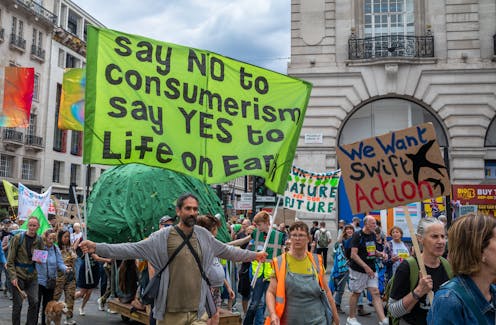Shop smarter, not harder. How gentle messaging can help the planet more than tough talk
- Written by Jasmine Mohsen, Doctoral Researcher in Consumer Psychology and Consumer Behaviour, University of Leeds

Fast fashion is booming, but so is its environmental toll. With up to 10%[1] of global carbon emissions linked to the industry, the over-consumption of cheap clothing has made sustainability campaigns more vital than ever. Yet, even as awareness of fast fashion’s environmental harm grows, many consumers remain resistant to changing their shopping habits.
My recent research[2] investigated a surprising obstacle to these campaigns: the language used to drive change. I explored how assertive messages such as: “Stop shopping to save the planet!” fare when pitted against softer suggestions along the lines of: “Consider shopping less for a greener future.”
The results reveal that pushy messaging not only fails but actively backfires, triggering anger and resistance that can undermine the campaign’s goals.
At the heart of this resistance lies psychological reactance[3] – a defensive reaction to perceived threats to personal freedom. Humans value autonomy, and messages that come across as commands (“must”, “stop”, “don’t”) can spark a “boomerang effect”, prompting people to defy the directive – even if they agree with its underlying intent.
This reluctance may be attributed to the fact that buying clothes is frequently linked to self-esteem[4], social desirability and confidence. Shopping is often an enjoyable and empowering experience, driven by personal choice and satisfaction. But when marketing relies on guilt or pressure, this positive engagement can shift to discomfort and resistance. Rather than nurturing real connections with brands’ messages, forceful campaigns risk weakening trust and consumer loyalty.
In the study, 196 participants in the US were shown posters designed as part of a campaign to reduce consumption. One group saw an assertive poster demanding they stop shopping to help the environment. The other saw a suggestive poster encouraging wise shopping for the same goal. Participants then completed surveys assessing their emotional responses and willingness to alter their behaviour.
The findings were clear. Assertive messages provoked stronger feelings of anger and defensiveness in the face of a perceived threat than suggestive ones. These negative emotions led to lower compliance with the campaign’s goals, showing that pushy language can diminish – rather than enhance – effectiveness.
The emotional fallout of assertive messaging doesn’t stop there. The study found that anger, sparked by perceived restrictions, affects consumer behaviour. Participants who felt their freedom was threatened were not only less likely to reduce shopping but also more likely to dismiss the campaign altogether. Anger adds another barrier to encouraging sustainable habits.
However, this anger can also fuel a desire to regain autonomy, pushing consumers toward action that reaffirms their independence. This could be resisting the message or making choices that feel self-directed – it may even drive consumers towards unsustainable choices.
The findings uncovered several insights for anyone designing campaigns to encourage sustainable consumption.
Read more: Five consumer myths to ditch in 2025[5]
First, go with suggestion over command. Messages framed as friendly suggestions, such as “consider” or “you might”, are less likely to provoke resistance and more likely to inspire positive change.
Second, focus on empowerment. Highlighting the autonomy of the consumer and the benefits of participation can encourage them to cooperate without threatening their individual freedom.
Third, educate with empathy. Campaigns that inform consumers about the environmental impact of their habits, without using forceful language, are better received.
In 2011, outdoor clothing brand Patagonia launched an advert with the message “Don’t Buy This Jacket”[6] – a good example of assertive language and reverse psychology. The campaign sent a message about buying less and taking care of the environment. As a strategy, this is known as “demartketing”[7].
Interestingly, although it used the “don’t” command, Patagonia was giving people a choice to ignore the message or question why they were buying the jacket in the first place. Although Patagonia’s sales jumped by 30%[8] the following year, the campaign was about more than selling. The company wanted to encourage people to think about the impact of Black Friday as well as their wider buying habits, and to consider repairing things, reusing them or buying clothing that would last longer.
Of course, these insights extend beyond fast fashion. Judgemental messaging has been shown to fail in areas such as smoking cessation, exercise and diet campaigns, suggesting that softer approaches may work better across a range of public health and environmental initiatives.
The environmental cost of fast fashion is undeniable, with millions of tons[9] of clothing wasted annually and more than a billion tons[10] of greenhouse gases emitted each year. Encouraging consumers to embrace sustainable habits[11], from buying secondhand to adopting minimalism, is vital. However, as our research shows, how we ask for that change makes all the difference.
If we want people to shop less for the planet’s sake, it might be worth abandoning the “here’s what you must do” messaging in favour of strategies that respect their freedom. This could be a powerful way to shift behaviour towards a sustainable future – one suggestion at a time.
References
- ^ 10% (www.sciencedirect.com)
- ^ research (www.researchgate.net)
- ^ psychological reactance (thedecisionlab.com)
- ^ self-esteem (psycnet.apa.org)
- ^ Five consumer myths to ditch in 2025 (theconversation.com)
- ^ “Don’t Buy This Jacket” (eu.patagonia.com)
- ^ “demartketing” (www.researchgate.net)
- ^ jumped by 30% (medium.com)
- ^ millions of tons (www.businesswaste.co.uk)
- ^ billion tons (www.sciencedirect.com)
- ^ sustainable habits (theconversation.com)







